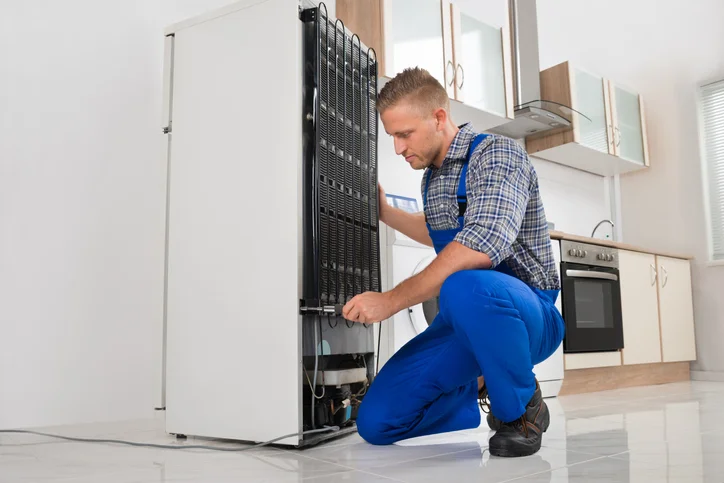Refrigerator Not Cooling? Refrigerator repair experts Dependable Refrigeration & Appliance Repair Offer Quick Troubleshooting Tips
Refrigerator Not Cooling? Refrigerator repair experts Dependable Refrigeration & Appliance Repair Offer Quick Troubleshooting Tips
Blog Article
Important Tips for Effective Ref Repair Work to Prolong Home Appliance Lifespan
When it comes to your fridge, appropriate repair and upkeep are important for longevity. Recognizing typical problems and understanding when to act can make all the difference.
Understanding Typical Fridge Issues
Fridges are crucial in keeping your food fresh, yet they can run into a variety of typical troubles that disrupt their efficiency. One frequent problem is poor cooling. If you see food spoiling quicker than normal, examine the thermostat settings or take into consideration if the door seals are harmed. An additional typical trouble is excessive noise, which might indicate a malfunctioning compressor or a stopping working follower. You might also experience water merging inside or underneath the refrigerator; this often arises from a blocked defrost drain or a defective water line. Furthermore, if your refrigerator's light isn't functioning, maybe a simple bulb problem or an issue with the door switch. Lastly, ice accumulation in the fridge freezer can impede air movement and cooling effectiveness. Identifying these problems early can save you money and time in repair work, guaranteeing your refrigerator runs smoothly and effectively.
Routine Upkeep Practices
To keep your devices running smoothly, you need to stay on top of routine upkeep techniques. Tidy the condenser coils, examine the door seals, and keep track of the temperature level setups to ensure peak efficiency. These simple jobs can conserve you time and cash on fixings down the line.
Tidy Condenser Coils Frequently
Cleaning your condenser coils regularly can substantially enhance your home appliance's performance. Dust and dirt build up on these coils over time, triggering your home appliance to function more difficult and eat even more power. To keep them clean, disconnect your device and thoroughly eliminate any safety covers.
Check Door Seals
Three straightforward actions can help you assure your appliance's door seals are in great condition. Initially, examine the seals frequently for any type of splits, rips, or signs of wear. These problems can lead to air leaks, affecting performance. Second, clean the seals making use of cozy, soapy water to eliminate any type of particles or gunk. A tidy seal ensures a tight fit and much better efficiency. Carry out a straightforward examination by shutting the door on an item of paper. If you can quickly pull it out without resistance, the seal might require changing. By following these actions, you'll preserve your home appliance's effectiveness and long life, saving you money on energy costs and fixings over time.
Monitor Temperature Settings
On a regular basis monitoring your device's temperature level setups is necessary for best efficiency and effectiveness. Utilize a thermostat to check these setups routinely, specifically after significant changes, like moving your home appliance or adjusting the thermostat. By remaining proactive regarding temperature level monitoring, you'll assure your home appliances run efficiently and last much longer.
Repairing Cooling Issues
When your fridge isn't cooling properly, it can lead to ruined food and squandered money, so resolving the concern promptly is important. Start by examining the temperature settings to validate they go to the suggested degrees, generally around 37 ° F for the fridge and 0 ° F for the fridge freezer. If the setups are proper, examine the door seals for any type of spaces or damages; a faulty seal can permit warm air to enter.
Examine the condenser coils, usually situated at the back or bottom of the unit. Tidy them with a vacuum or brush to optimize performance. If problems persist, it may be time to call a specialist.
Dealing With Water Leak and Ice Accumulation
If you're managing water leak or ice build-up in your device, it's necessary to recognize the resource of the problem. By pinpointing where the water is originating from, you can stop more problems and stay clear of expensive repair services. Let's explore some effective approaches to take on these usual troubles.
Determine Leakage Sources
Just how can you gas stove repair service near me properly identify the resources of water leakage and ice build-up in your home appliances? Start by inspecting the seals and gaskets on your refrigerator and freezer doors. A used or broken seal can enable cozy air to go into, causing condensation and ice. Next off, examine the drainpipe frying pan and drainage system for obstructions or obstructions; a backed-up drainpipe can result in water pooling. Try to find any loosened connections in the water line, which can develop leaks. Take a look at the defrost drain for ice buildup, which might interfere with appropriate water drainage. By systematically checking these locations, you'll pinpoint the source of the trouble, allowing you to take the essential steps to fix it and extend your home appliance's life-span.
Stop Ice Formation
To avoid ice formation in your appliances, start by confirming the temperature settings are suitable. If your fridge or freezer is as well chilly, it can cause extreme ice build-up. Inspect the door seals routinely; damaged seals can let warm air in, creating condensation and ice formation.
Maintain the appliance well-ventilated and avoid overcrowding, as this can block air flow - Washing Machine Repair Dependable Refrigeration & Appliance Repair Service. Additionally, consistently thaw your freezer if it does not have an automated defrost attribute.
If you see water leak, identify and fix any type of obstructed water drainage holes, as they can add to ice accumulation. Ultimately, tidy the coils and validate they're operating effectively to maintain peak performance. Taking these actions will certainly aid extend your device's lifespan and effectiveness.
Attending To Noisy Refrigerator Sounds
While it may appear worrying, a loud refrigerator usually signals small concerns rather than significant breakdowns. Common offenders consist of the compressor, followers, and water lines.
Following, look for loosened products inside. Often, containers or shelves can rattle, producing undesirable sound. Tighten up or reposition them to remove the sounds.
If you discover a clicking sound, it might be the defrost timer. This is normally harmless but could suggest it requires assessment.
An unbalanced appliance can generate resonances and noise. Washing Machine Repair Dependable Refrigeration & Appliance Repair Service. Attending to these issues immediately can assist preserve your fridge's performance and prolong its life-span.
When to Replace Parts vs. Complete Replacement

Consider the cost of repair services versus the device's worth. Furthermore, if you notice continuous troubles that keep persisting, it's a sign that your appliance has gotten to the end of its life.
Recognizing When to Call a Professional
How can you tell when it's time to employ a professional for home appliance fixing? If you discover unusual sounds, smells, or leaks, it's a clear signal that something's incorrect. Don't disregard these indicators; they commonly show much deeper problems. find out here If your appliance quits working altogether or often trips circuit breakers, it's an additional warning.
You need to likewise consider your very own convenience level with repairs. If you're unclear regarding diagnosing the trouble or lack the right devices, it's best to get to out for aid. Keep in mind, trying complex repair work can bring about more damages or also safety hazards.

Regularly Asked Inquiries
Exactly how Frequently Should I Tidy the Refrigerator Coils?
You ought to clean your refrigerator coils every six months. This assists keep effectiveness and stops getting too hot. If you see too much dust or pet hair, clean them much more regularly to assure your refrigerator runs smoothly.

Can I Make Use Of Vinegar for Cleaning My Fridge?
Yes, you can use vinegar to clean your refrigerator! It's an exceptional all-natural cleaner that gets rid of smells and discolorations. Washing Machine Repair Dependable Refrigeration & Appliance Repair Service. Just blend it with water, apply it to surfaces, and clean down for a fresh, tidy refrigerator
What Temperature Should My Refrigerator Be Ready To?
You need to establish your fridge to 37 ° F(3 ° C) for excellent food preservation. This temperature maintains your food fresh while preventing putridity, ensuring your grocery stores last much longer and decreasing waste. It's a simple change you can make!
Does a Fridge Need to Be Leveled?
Yes, your fridge needs to be leveled. If it's uneven, it can impact cooling performance and cause excess noise. Examine the leveling legs and readjust them to guarantee appropriate equilibrium for suitable efficiency.
Just How Can I Decrease Refrigerator Energy Intake?
To decrease your refrigerator's energy consumption, maintain it tidy and well-ventilated, check door seals for leakages, set the temperature between 35-38 ° F, and stay clear of overwhelming it. These actions can substantially lower your power costs.
Report this page